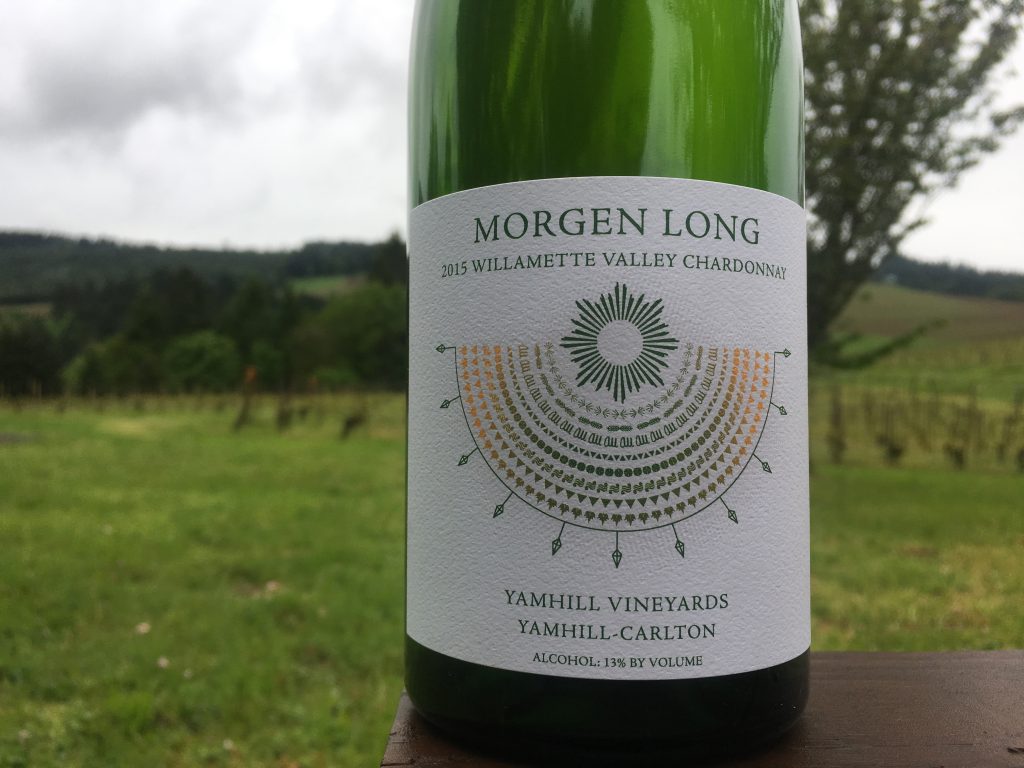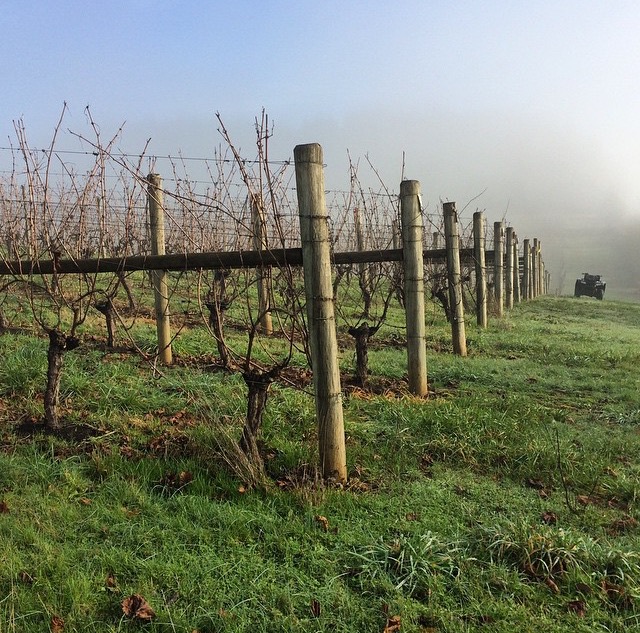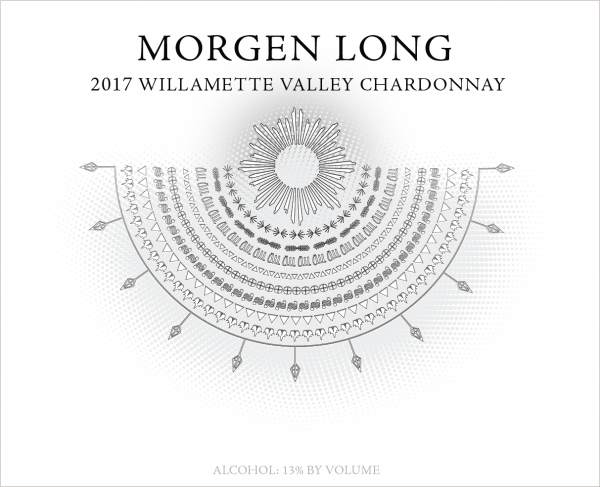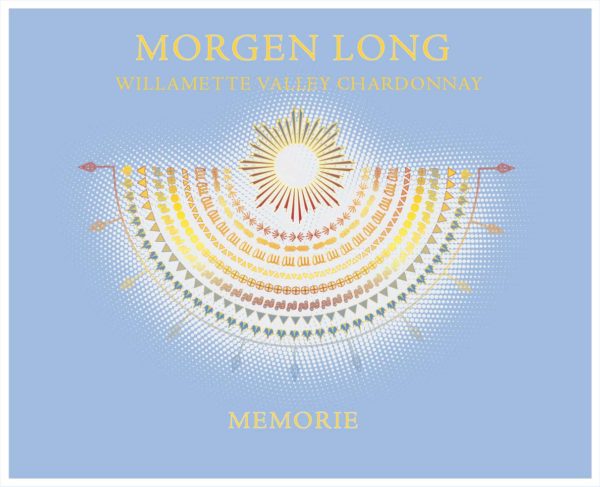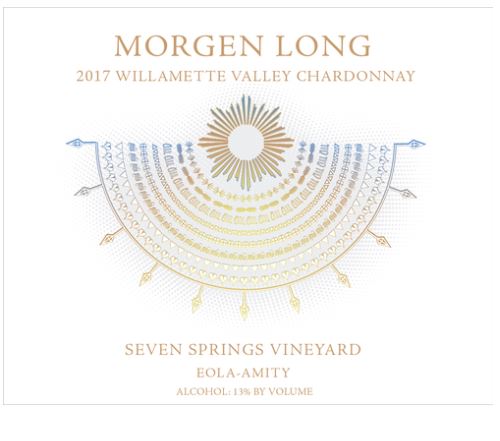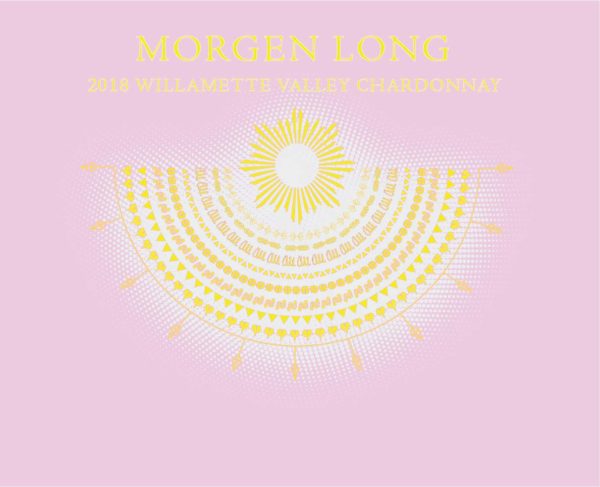Morgen Long
Seth Morgen Long is a young Oregon winemaker who focuses on site-driven Willamette Valley Chardonnay under the label, Morgen Long. After gaining a certification as Sommelier in 2009 and 2010, he created various opportunities to travel the world to discover the craft of winemaking from the inside out. Before starting Morgen Long in 2014, he worked with winemakers in the Willamette Valley, Oregon (2009, 2010, 2011), Central Otago, New Zealand (2011), Santa Cruz Mountains, California (2011) and in Meursault, Burgundy, France (2012, 2013). He is obsessive about Chardonnay and values deep ecology, approaching winemaking with the view that thoughtful, ethical decisions in the vineyard and attention to details in the winery allow for wine to be both delicious as well as authentic and transparent. Bringing this level of integrity to the art and business of winemaking, Seth uses traditional methods of production learned in around the world to make Oregon Chardonnay that is superlative and as age-worthy as it is enjoyable on release. Morgen Long Chardonnay is produced at Lingua Franca, a winery in the Eola-Amity Hills. Every effort is made to work with farmers who value ecology, sustainability and at best, live on and love the land they farm. Seth’s vision of Oregon Chardonnay honors history, grape, time and place, from vine to bottle.
"For a debut Chardonnay, it's clear that he has worked alongside people that know how to make great wine and now it is about to benefit Oregon. Look out for this guy." - Neal Martin, Wine Advocate
Wines
Willamette Valley Chardonnay
Varietal: Chardonnay
Color: White
Farming Practice: Sustainable
100% Willamette Valley Chardonnay from six non-irrigated vineyards planted between 1968-2012. 40% Seven Springs Vineyard, 20% Durant, 15% Loubejac, 15% AlexEli, 7% Yamhill, 3% The Eyrie. Hand-picked between September 10th and October 2nd, 2018, each site was pressed uniquely. Fermentation with ambient yeasts began in a mix of new 350L puncheons, neutral 228L barrels and stainless steel. Six of the nine barrels fermented dry in four weeks and uninoculated malolactic finished in December. Three of nine barrels fermented dry in the spring, slowed down by malolactic that completed in late October. After one year in 25% new oak 350L puncheons and 75% neutral 228L barrels, the 2018 Willamette Valley Chardonnay was blended for a second winter in stainless steel. Lightly fined with bentonite, this wine was bottled without filtration after 18 months aging, in March 2020. 200 cases made.
Willamette Valley Chardonnay ‘Durant Vyd’
Varietal: Chardonnay
Color: White
Farming Practice: Sustainable
Sustainable. 100% Willamette Valley Chardonnay from Durant Vineyard. Non-irrigated, sustainably farmed Dijon 76 and 95 Chardonnay. Planted in pure Jory silty clay loam soil over volcanic basalt in 1999/2000 on rootstock. Vines spaced 4×9, facing east around 400’ on a gentle slope. Hand-picked on September 10th, 2018, Durant Chardonnay was crushed before pressing and the juice was lightly sulfured after 12 hours of settling. Ambient yeast fermentations began in steel and completed in 350L and 228L French oak barrels within four weeks. Uninoculated malolactic started in early November and completed between March and June. After one year in 22% new 350L puncheons and 78% neutral 228L barrels, 2018 Durant Vineyard Chardonnay was blended for a second winter in stainless steel. Lightly fined with bentonite, this wine was bottled without filtration after 18 months aging, in March 2020. 175 six packs made.
Willamette Valley Chardonnay ‘Eyrie Vineyard’
Varietal: Chardonnay
Color: White
Farming Practice: Organic
Organic. 100% Willamette Valley Chardonnay from The Eyrie Vineyards. Organically farmed, non-irrigated 1968-planted Draper selection, hailing from European plant material brought to Draper Ranch, Napa Valley in the 1930’s. Planted in pure Jory silty clay loam soils over volcanic basalt in 1968 on own-roots. Vines spaced 9×5, facing south between 350’-375’ on a 9% slope. Hand-picked on October 2nd, 2018, the fruit was crushed before hard pressing. The juice was settled and lightly sulfured after 12 hours. Fermentation began with ambient yeast in in a once filled 228L French oak barrel. Uninoculated malolactic completed in December, and Eyrie fermented into the spring. After one year in barrel, the 2018 Eyrie Vineyards Chardonnay was racked to stainless steel for a second winter. Lightly fined with bentonite, this wine was bottled without filtration after 18 months aging, in March 2020. 50 six packs made
Willamette Valley Chardonnay ‘Marine’
Varietal: Chardonnay
Color: White
Farming Practice:
100% Willamette Valley Chardonnay from three, non-irrigated vineyards planted in mixed marine sediment soils between 1981-2008. (43% Loubejac, 40% AlexEli, 17% Yamhill). Hand-picked between September 26th and 28th, 2018, whole clusters from each site were each uniquely pressed and lightly sulfured after six hours of settling. Ambient yeast fermentation began in steel, 350L and 228L French oak barrels. Uninoculated malolactic completed in November and the barrels were lightly sulfured. If ambient yeasts did not re-engage, selected yeasts were employed to help finish primary fermentation. After one year of aging in 15% new 350L French oak puncheons, 40% neutral 228L barrels and 45% stainless steel, the 2018 Marine Chardonnay was blended for a second. 275 cases made
Willamette Valley Chardonnay ‘Memorie’ Solera
Varietal: Chardonnay
Color: White
Farming Practice:
00% Willamette Valley Chardonnay. Memorie is a multi-vintage solera which blends every single Chardonnay from 2014-2018. This wine investigates how time sorts distinct wines into a single expression of all. The first release (Memorie I) blends twenty-five unique lots of Willamette Valley Chardonnay from six vineyards over five successive vintages: 29% – 2018, 29% – 2017, 12% – 2016, 29% – 2015, <1% –2014. Memorie began with a neutral 228L French oak barrel of 2015 Yamhill Vineyard Chardonnay, which benefitted from topping up from three vintages over two years in barrel on lees. After exhausting 2015 topping wine, 2014 Chardonnay from bottle kept the barrel topped until the 2016 Chardonnays were complete with primary fermentation. In August 2017, the multi-vintage wine and lees were gas racked to stainless steel. Since then, a gradual process of fractional blending has integrated every single lot of Chardonnay I have produced into one wine. In August 2017 and March 2018, Chardonnay and lees from 2016 wines increased the solera. In August 2018 and February 2019, Chardonnay and lees from 2017 wines increased the solera. In August 2019, the solera was split into a base and a wine set to bottle, and 2018 Chardonnay was gas racked to the portion set to bottle. In February 2020, Chardonnay and lees from 2018 wines increased the base of the solera, continuing the process of fractional blending. Lightly fined with bentonite, this wine was bottled without filtration after 18 to 54 months aging, in March 2020. 40 cases made
Willamette Valley Chardonnay ‘Seven Springs Vyd’
Varietal: Chardonnay
Color: White
Farming Practice: Biodynamic
Biodynamic. 100% Willamette Valley Chardonnay from Seven Springs Vineyard. Biodynamically farmed, non-irrigated Dijon clone 95 and 76 Chardonnay. Planted in Jory and Nekia silty clay loam soils over volcanic basalt in 2012 on 101-14 rootstock. Vines spaced 4×6, facing southeast and ranging from 500ft-550ft on a 2.7%-5.5% slope. Both blocks were hand-picked on September 20th, 2018. Three pressings were done: one lot was foot tread and soaked for six hours before crushing, one lot was crushed into the press and one lot was whole cluster pressed. After 12 hours of settling, the juice from each lot was lightly sulfured. Ambient yeast fermentations finished dry in French oak within four weeks. Uninoculated malolactic completed between late October and early December. After one year in 20% new 350L puncheons, 20% once filled 228L barrels, and 60% neutral 228L barrels, the 2018 Seven Springs Vineyard Chardonnay was blended for a second winter in stainless steel. Lightly fined with bentonite, this wine was bottled without filtration after 18 months aging, in March 2020. 200 six packs made
Willamette Valley Chardonnay ‘Volcanic’
Varietal: Chardonnay
Color: White
Farming Practice:
100% Willamette Valley Chardonnay from two non-irrigated vineyards planted in mixed volcanic basalt soils between 1999-2012. 60% Seven Springs, 40% Durant Vineyard. Hand-picked respectively on September 10th and 20th, 2018, both lots were uniquely crushed and settled for 12 hours before the juice was lightly sulfured. Fermentation began with ambient yeasts in a mix of stainless steel, 350L and 228L French oak barrels. Fermentation finished in oak within four weeks. Uninoculated malolactic began in late December and completed in the spring of 2019. After one year in 10% new 350L puncheon, 40% once filled 228L and 40% neutral 228L barrels, the 2018 Volcanic Chardonnay was blended for a second winter in stainless steel. Lightly fined with bentonite, this wine was bottled without filtration after 18 months aging, in March 2020. 90 six packs made
Willamette Valley Chardonnay Pink Label
Varietal: Chardonnay, Pinot Noir (lees only)
Color: White
Farming Practice: Sustainable
95% Chardonnay from Seven Springs Vineyard and 5% Pinot noir and lees from Maresh Vineyard. The 2018 Pink Label Chardonnay continues to explore how minute additions of Pinot noir and Pinot noir lees can enhance the dimensions of Chardonnay, creating a unique rosé wine which is rare, modest and distinct. Seven Springs Chardonnay was hand-picked and pressed on September 20th, 2018. After 12 hours of settling, the juice was lightly sulfured. Ambient yeast fermentations finished dry in French oak within four weeks. Uninoculated malolactic completed between late October and early December. After nine months aging on lees in neutral 228L French oak barrels, Springs Vineyard Chardonnay was gas racked to a neutral 300L puncheon and dosed with 5% 2018 Pinot noir and lees from Maresh Vineyard. The wine spent the second winter in puncheon with no lees stirring before being gas racked to stainless steel in February 2020. Lightly fined with bentonite, this wine was bottled without filtration after 18 months aging, in March 2020. 40 cases made

